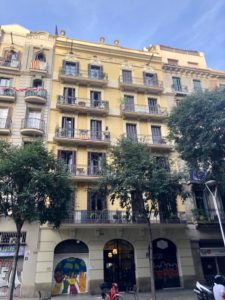Struggling to get on the housing ladder, it’s little wonder young professionals are dismissing London for cheaper more exciting European hubs. We speak to recent graduate Olivia Way about her relocation to Barcelona and outline other cities where the lifestyle and job opportunities are attracting sun-seeking millennials…
The millennials beating sky-high property prices
London’s grey skies, expensive lifestyle and crowded public transport are just distant memories for 24-year-old Olivia, whose move to Barcelona this year means she can now stroll to work under balmy blue skies, indulge in daily tapas and enjoy weekend trips to the beach.
If you’re moving soon to Spain, make sure to get your free tickets to Your Overseas Home at Harrogate on 5th October or Epsom on 9th November. It’s a new style of property show, specifically for serious buyers to get answers to detailed questions and be introduced to trusted lawyers, agents and currency providers.
Before relocating to the Catalan city, Sussex-born Olivia followed the well-trodden path of the typical British graduate. In 2017 she headed to London where she landed her first job at a financial services firm. Home became a shared rental flat in the north-west of the city, a long dreary tube ride from her office. Fast forward two years, and in July she swapped all that for a new life in Barcelona, alongside her Venezuelan boyfriend Mario who also moved over from London.
“Life really is more enjoyable here,” said Olivia. “There is a definite city vibe, but compared to London it’s far more relaxed and you can enjoy yourself without breaking the bank. Plus, there is the bonus of both being by the sea and having the mountains nearby. It’s got a bit of everything.”

Olivia Way and boy friend Mario have swapped overpriced London for affordable Barcelona and a life in the sun.
Both Olivia and Mario secured full-time employment before arriving in Barcelona. “I have a job at a company called AirDNA, which provides data on the international vacation rental market. The people there are mixture of British and other Europeans, and the office is really central at the top of Avinguda Diagonal. My working day there starts – and ends – late, which enables me to continue working remotely for my previous London employers, which I do for a couple of hours each morning. Mario is a business development manager for a market intelligence firm in the emerging CBD sector, which again has a mix of nationalities. His office is also central.”
In the run-up to relocating Olivia was wary of the fast-approaching Brexit date so was relieved to get to Barcelona when she did. “I’ve got all my relevant documents now, such as NIE and social security number, and I’m contractually employed so I feel pretty safe. Mario has a Swedish passport, so he’s had no issues with documents. The paperwork process wasn’t necessarily tricky but it was slow. Spanish bureaucracy isn’t the fastest but I can let that go because the city makes up for it!”

Olivia and Mario have found a fantastic flat in the Eixample district, in the heart of Barcelona.
After initially staying with friends, in August Olivia and Mario moved into their own rented two-bedroom apartment, after viewing around a dozen properties. Used to the London market, they were chuffed at what they could get in Barcelona. “We live in L’Eixample, a lovely district about 10 minutes’ walk from the old town and 25 minutes from the beach,” continued Olivia. “Our rent is €1,190 per month. In London my friend and I were paying £1,400 for a two-bed in a nondescript street in Zone 3 and Mario was paying £1,225 for a one-bed! So, it feels much better value here.”
They found their flat through Spanish property website Idealista. On the second floor of a period building, it includes a small terrace and original windows and tiles. They avoided heavy agency fees by dealing with the landlady direct.
“We love it,” added Olivia. “And everything is so close that I tend to walk most of the time. Otherwise for €50 a month you can buy a travel ticket that lets you travel on the metro and all buses – again, great value compared to London. And there are apps that let you pick up and drop off a scooter at various points around the city – it’s really cheap and easy to use. We’re looking at buying our own scooter at some point in the future, then we’ll really feel like locals!”
The era of international urban millennials
Never has there been more choice for young professionals seeking an alternative to London to enjoy an exciting urban lifestyle.
According to Head of International Residential at Savills Hugo Thistlethwayte, millennials tend to love cities that give them modern living, access to culture, sport and a 24-hour lifestyle.
Millennials are increasingly looking for the same quality of life in their primary home and they not afraid to move or combine a place to work with a place to live and play
“London, Berlin, Barcelona, Madrid, Miami, LA and New York exemplify this, with amenities and facilities at their heart,” said Thistlethwayte. “This need for a city buzz is not just for a second or weekend holiday home. Millennials are increasingly looking for the same quality of life in their primary home and they not afraid to move or combine a place to work with a place to live and play… They are not great commuters, preferring to live and work in the city centre and often will hire a car when required rather than own their own.”

Olivia’s new home.
A key trigger for Barcelona’s rise to becoming a major international city and for swathes of urban regeneration was its hosting of the 1992 Olympics. Since then it has become not only a global tourist destination, but also a major hub for European business, culture, conferences, media and sport.
Find out more about financing your move and dream home with the tips and tricks in your free Spain Finance Guide.
“Barcelona is increasingly attracting a more dynamic workforce, lured in by growing numbers of innovative, well-funded start-ups and leading tech companies, including Amazon and Facebook, who have established operations in what is fast becoming Europe’s Silicon Valley,” said Wim Braem at estate agency Lucas Fox who are based in the city. “This is pushing up demand for good quality rentals in prime locations – good news for owners looking to earn healthy rental income from their investments.”
Elsewhere, Lisbon has seen significant regeneration in recent years, helping it attract foreign investment on both residential development and trade levels. The Portuguese capital has become a major hub for international start-ups, in particular in the tech sector. Like in Barcelona, foreign professionals coming to work there are attracted by the city’s affordability, vibrant lifestyle and its lively tourism scene.











